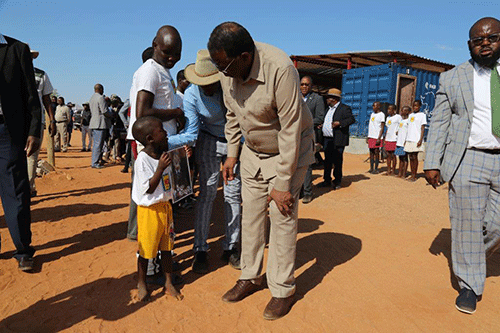President Hage Geingob has said the government continues to make great investments in the well-being of the Namibian child to give them a better future by providing free education from the primary to the secondary level, grants for orphans and vulnerable children as well as school feeding schemes.
In his message commemorating World Children’s Day on Sunday, Geingob said the government has made significant progress in recent years in protecting the rights of the most vulnerable children in our society, especially orphans.
“The government has advocated for children’s rights by outlawing corporal punishment in Namibian schools,” he said.
“To ensure no Namibian child stays out of school because of hunger, the government provides meals to feed children in food-insecure communities through the Namibia School Feeding Programme (NSFP).”
He said, as a nation, Namibia should ensure the well-being of the country’s children is protected, and that their interests include any development agenda affecting them now and in the future.
“We must continue to ensure that the interests of children are always at the centre of our socio-economic development programmes.”
“Let us promote and celebrate children’s rights, translating them into dialogues and actions that build a better country for our children,” he stressed.
Geingob said Namibia considers the fulfilment of children’s rights a collective duty.
“It is an investment in the future of the Namibian nation. By investing in children, we are investing in a peaceful, inclusive and prosperous Namibian house,” he said.
Geingob says children’s views should be heard on many important issues affecting them. He said parents, caregivers and the government exist and are instrumental in creating an inclusive environment that enables children to succeed.
Geingob said it is the responsibility of leaders and caregivers to bring awareness to children about violence in the forms of abuse, rape, exploitation and discrimination, as well as to provide an environment in which children are cared for, loved and provided with basic services to grow to their full potential.
“We should understand that every action or lack thereof affects the future of children and the Namibian House,” Geingob said.
Universal Children’s Day, also known as World Children’s Day, is marked on 20 November.
This year, the day is celebrated under the theme, ‘Inclusion for Every Child’.
This was the date in 1959 when the UN General Assembly adopted the Declaration of the Rights of the Child.
On the same day in 1989, the UN General Assembly adopted the Convention on the Rights of the Child.
World Children’s Day is observed to promote international cooperation and awareness among children all over the world.
UNICEF promotes and coordinates this special day, which also works towards improving children’s welfare.


